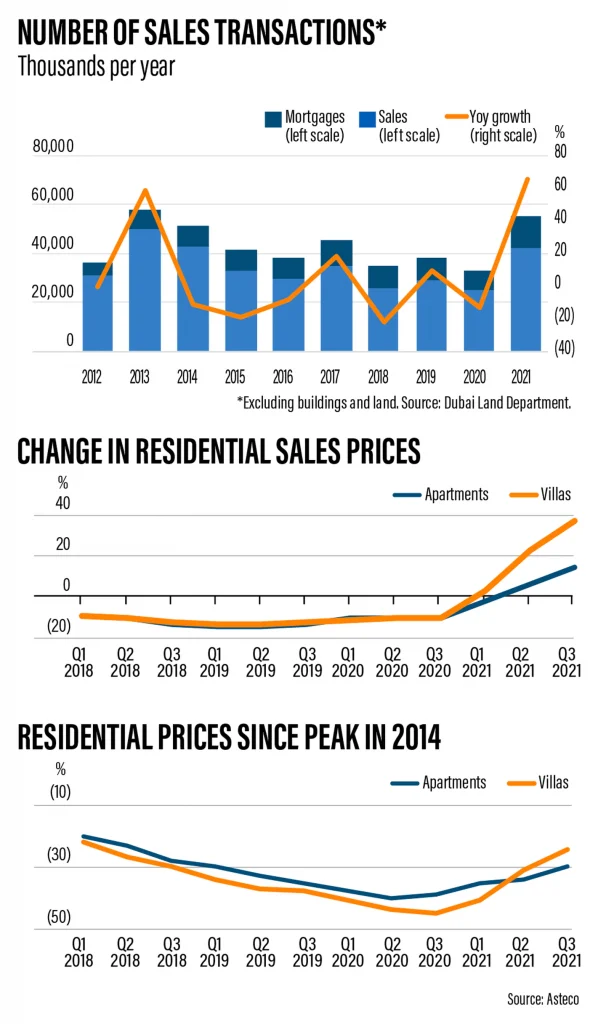Dubai residential property prices and rents to continue increasing in 2022, says S&P
Developers will see revenue growth accelerate over the next four to five years
Property prices and rents in Dubai’s residential market will continue to increase in 2022, in line with the trend of 2021, on the back of the emirate’s “strong economy”, a report by S&P Global Ratings has said.
This year should deliver “moderate increases in prices and rents as well as strong sales”, which will encourage developers to launch new projects, the report said.
Properties are also “relatively affordable” with prices 25 per cent to 30 per cent below 2014 levels, despite a significant rise in 2021.
“High oil prices will remain an important positive factor for investor sentiment in the GCC region,” S&P said. “Geopolitical tensions could highlight Dubai’s reputation as a haven and provide a boost to demand.”
The UAE’s property market has recovered strongly from the coronavirus-induced slowdown on the back of government initiatives such as residency permits for retirees and remote workers, as well as the expansion of the 10-year golden visa programme.
The value of property deals in Dubai more than doubled last year and broke a 12-year record in terms of volumes, Property Finder said. The emirate registered 61,241 sales deals worth Dh151.07 billion ($41bn) in 2021, making it the best year for transactions since 2013 and the highest in terms of value since 2009.
The trend has continued into this year as well. Total residential activity in Dubai rose 34 per cent annually to Dh15.5bn in February, with 6,913 units sold. This was primarily driven by a three-time surge in the value of off-plan sales and a 107 per cent rise in the sale of ready homes, Egyptian investment bank EFG Hermes said.
Continuing growth in transaction volumes, strong demand for off-plan properties and new project launches will continue to support the residential market this year, S&P said.
“The addition of about 30,000 units over 2022 should moderate price and rent increases,” the report said.
The rating agency also anticipates slower growth in mortgage transaction volumes (at about 20 per cent to 25 per cent of total sales) due to interest rate rises, which will be partly offset by favourable payment plans.
On the back of a buoyant market, property developers will see revenue growth accelerate over the next four to five years, which will be tempered by a steady supply of residential properties and new developments, the report said.
Developers such as Emaar Properties and Damac have benefited from a strong rebound in cash flow from operations in 2021 after they delivered a large number of units launched back in 2016 and 2017.
Cash collections will remain high in 2022, backed by a “sizeable pipeline” of projects to be delivered during the year, S&P said, adding that capital intensive new launches will weigh on cash flow generation from 2023 to 2024.
“We expect limited asset impairments in 2022 as the Dubai real estate sector’s outlook has significantly strengthened. Net profit margins will improve on lower assets and receivables impairments,” the report said.
“Pressure on profitability will ease and S&P’s adjusted debt to Ebitda [earnings before interest, taxes, depreciation and amortisation] metrics will improve as Ebitda increases. New projects that are working capital intensive will limit this deleveraging for some, while interest rate hikes will affect capitalisation rates and weaken loan-to-value ratios.”
Some developers may also consider disposing non-core assets as valuations rise.
While higher energy prices and cost inflation will drive companies to focus on cost efficiencies, developers are “somewhat protected” from the effect of higher raw materials costs in the short run, which are borne by contractors.
“The introduction of corporate taxes in the UAE is viewed as a manageable medium-term risk, with no cash impact before 2024,” S&P said.














